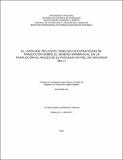| dc.contributor.advisor | Mora Chacón, Elizabeth | |
| dc.contributor.author | Saprissa Vargas, Tatiana María | |
| dc.date.accessioned | 2020-06-03T05:05:24Z | |
| dc.date.available | 2020-06-03T05:05:24Z | |
| dc.date.issued | 2016 | |
| dc.identifier.uri | http://hdl.handle.net/11056/17494 | |
| dc.description.abstract | La monografía abarca el conflicto entre el movimiento feminista y los expertos del idioma en dar
uso de un español con lenguaje inclusivo para ambos géneros; no sexista. La polémica recae
en que los académicos retratan al español como una lengua que incorpora morfemas neutros y,
en cambio, el feminismo señala y desaprueba el uso del género masculino como indicativo
neutral. Partiendo del texto de la feminista socialista Gioconda Belli, El país bajo mi piel (2001)
y su traducción por Kristina Cordero, The Country Under my Skin, se analizan 9 muestras que
podrían dar paso a la creación de una guía de estilo o estrategias de traducción apropiadas
para el reto traductológico que representa el conflicto socio cultural del lenguaje inclusivo. Las
bases teóricas de Amparo Hurtado, Christiane Nord, Jean Paul Vinay y Jean Darbernet, Gideon
Toury y Gerd Wotjak sobre los métodos del traductor, la función de la traducción en la lengua
meta, las normas organizativas del proceso de la traducción y los procedimientos técnicos del
proceso de traducción que llevan al traductor a tomar sus decisiones, darán paso a la posible
solución del reto en cuestión. Luego de realizar dicho análisis y además proponer diversas
maneras de traducción para las muestras seleccionadas, se concluye que, a pesar de que es
posible generar traducciones neutras sin necesidad de modificaciones gramaticales o
duplicación, el traductor es responsable de transmitir el mensaje original y aplicar las guías
según el escenario al que se enfrente. | es_ES |
| dc.description.abstract | This graduation project studies the conflict between the feminist movement and language
experts in the use of neutral Spanish forms for both genders; nonsexist. The controversy ignites
when experts declare Spanish as a language that includes neutral morphemes and, on the
other hand, feminism stresses and disapproves the use of male gender as a neutral indicative.
Based on the text from Gioconda Belli, a socialist feminist, El país bajo mi piel (2001) and its
translation by Kristina Cordero, The Country Under my Skin, 9 samples were taken from the text
to analyze and develop a style guideline or appropriate translation strategies to confront the
translation challenge imposed by the cultural conflict of inclusive language. The theories of
Amparo Hurtado, Christiane Nord, Jean Paul Vinay and Jean Darbernet, Gideon Toury and
Gerd Wotjak regarding translator methodology, function of the translation for its target audience,
the organizational norms of the translation process and other technical procedures that lead the
translator to make his own decisions, will eventually be the possible solution to the challenge.
After analyzing and proposing other translation alternatives for the selected samples, it is
concluded that, although it is possible to develop neutral translations with no need of grammar
modifications or duplication, the translator is responsible for transmitting the original message
and apply the guidelines according to the scenario. | es_ES |
| dc.description.sponsorship | Universidad Nacional, Costa Rica | es_ES |
| dc.language.iso | spa | es_ES |
| dc.publisher | Universidad Nacional, Costa Rica | es_ES |
| dc.rights | Acceso abierto | es_ES |
| dc.rights | Attribution-NonCommercial-NoDerivatives 4.0 Internacional | * |
| dc.rights.uri | http://creativecommons.org/licenses/by-nc-nd/4.0/ | * |
| dc.subject | GENERO (SEXO) | es_ES |
| dc.subject | GRAMÁTICA | es_ES |
| dc.subject | INTERPRETACIÓN (TRADUCCIÓN) | es_ES |
| dc.subject | LENGUAJE | es_ES |
| dc.subject | TRADUCCIÓN | es_ES |
| dc.subject | GENDER (SEX) | es_ES |
| dc.subject | GRAMMAR | es_ES |
| dc.subject | INTERPRETATION (TRANSLATION) | es_ES |
| dc.subject | LANGUAGE | es_ES |
| dc.subject | TRANSLATION | es_ES |
| dc.title | El lenguaje inclusivo análisis de estrategias de traducción sobre el género gramatical en la traducción al inglés de El País Bajo Mi Piel de Gioconda Belli | es_ES |
| dc.type | http://purl.org/coar/resource_type/c_bdcc | es_ES |
| una.tesis.numero | 418.02 S241L | es_ES |
| dc.description.procedence | Escuela de Literatura y Ciencias del Lenguaje | es_ES |


